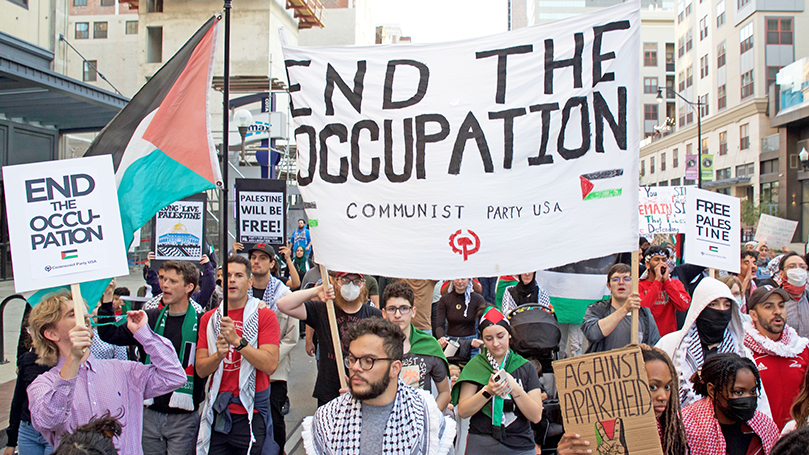
Grassroots activists from around the country met in New York City November 11–12 for a Communist Party USA peace conference. Responding to Israel’s razing of Gaza, the conference focused on demanding a ceasefire. “I really feel that we’re united and determined in this effort,” CPUSA co-chair Rossana Cambron remarked.
Throughout the weekend, the gathering’s participants were uplifted by songs of freedom led by artists belonging to the People’s Music Network. “Our people’s music was a basic part of the proceedings,” said Ben Bath, the conference’s cultural coordinator.
Henry Lowendorf, of the party’s Peace and Solidarity Commission asked the assembly, “How can we build on the ideas and energy of activists in labor, civil rights, environment, women, youth, and LGBTQ movements to change the militaristic policies of the Biden administration? How can we build broad unity around peace to defeat the extreme-right in 2024?”
Moderated by the Reverend Annie Allen on Saturday and Angela Maske on Sunday, the conference featured presentations from leaders of the Communist Party of Israel and the Palestinian People’s Party.
“The only solution to the occupation is a political agreement,” Aida Touma-Sliman of the Communist Party of Israel said. Touma-Sliman is an elected member of the Israeli Knesset for the Hadash party, though she was recently suspended from the Knesset for opposing Israel’s war on Gaza.
She described the Hamas attack on October 7th as “horrific and shocking,” but said “nothing legitimizes this crazy war,” which she called an ethnic cleansing, “led by the most right-wing, fascist government ever in Israel.” Palestinians are also being killed, evacuated, and arrested by the thousands in the West Bank.
Touma-Sliman urged her audience to continue to struggle to stop the war, for an exchange of hostages and prisoners, and to stop the harassment and violations of the rights of Jewish and Arab people in Israel.
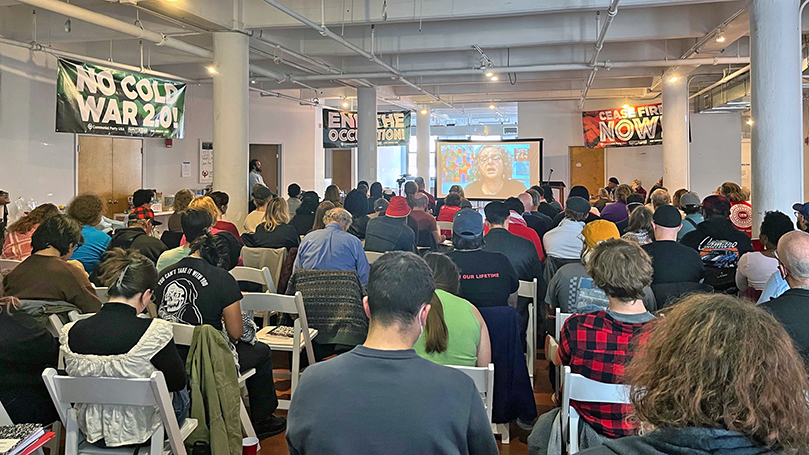
Dr. Aqel Taqaz, the International Secretary for the Palestinian People’s Party, which has a seat on the Executive Committee of the Palestine Liberation Organization, spoke on Sunday morning.
In stark contrast to its official policy positions, Dr. Aqel Taqaz noted the U.S. is “trying to empty Gaza of Palestinians,” and “in the UN Security Council, prevented many resolutions to have a ceasefire.”
“All Palestinian organizations,” he said, are “fighting for a Palestinian independent state on the basis of the UN resolutions.” After this conflict, his party believes there will be an opportunity for an international conference to solve the Palestinian issue, not mediated by the U.S., and with the participation of the United Nations.
Responding to the idea of a one-state solution, he said that “a state ‘from the river to the sea’ will be an apartheid state,” given the current balance of power. “A democratic state, with all the people having the same rights — it would be very nice, but, … it is difficult, in this period, to have this kind of solution.”
In his introduction to the conference, Lowendorf expressed solidarity with the people of Palestine and underlined the political battles ahead. “One thing we have before us is the toolkit provided by the Political Action Commission. It contains four pieces of legislation that support a cease-fire and ending arms sales to Israel; cutting the military budget and shifting those funds to end poverty, racism, and environmental devastation; and abolishing nuclear weapons.” He also called for ending the Cold War 2.0 against China, shutting down the 800 U.S. foreign military bases around the world, and dissolving NATO and AFRICOM.
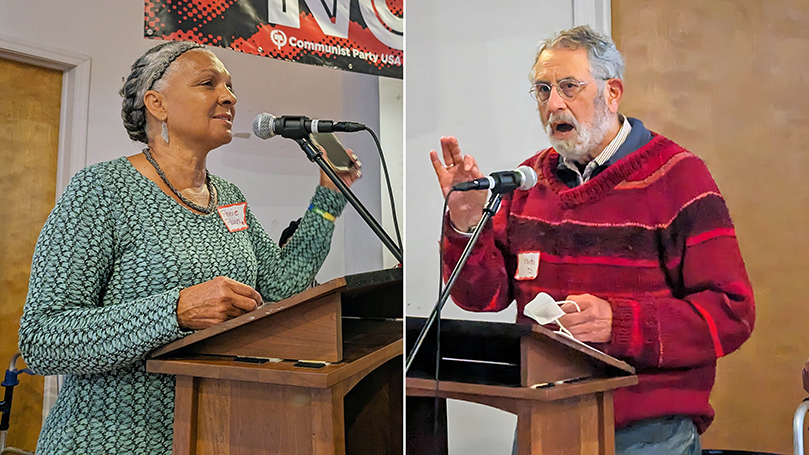
“The only winners in these wars are the merchants of death — the Lockheed Martins, Boeings and Raytheons, and the giants of the fossil fuel industry.”
Lisa Armstrong of the women’s collective brought home this point. “In 2022, the average taxpayer gave $1,087 just for federal military contracts — four times what the same average taxpayer gave to K–12 education.” She highlighted the need for investments into child care and long-term care and expanding programs like the Child Tax Credit, SNAP, and other programs.
The “economics of peace,” Armstrong said, are about “creating a social fabric, and relationships around the world that reinforce our shared, indeed mutual needs for food, clothing, shelter, education, rest, creativity, joy and well-being.”
“There are peace constituencies alive and ready to build today’s peace movement,” Rosalio Munoz of the Political Action Commission said. “This effort will take nuts and bolts organizing — working person to person, block to block, precinct by precinct, and engaging in other effective activities such as phone banks, petitions, delegations to our elected representatives, direct action, and more.”
“I do have some bad news,” Kooper Caraway of the Labor Commission warned. “Our bosses are still in charge of our government.” He connected the desperate situations they have created for working people to the poverty draft. “The reason it is important for the labor movement to build the peace movement is because our children are being funneled by our bosses into that vicious military industrial complex.”
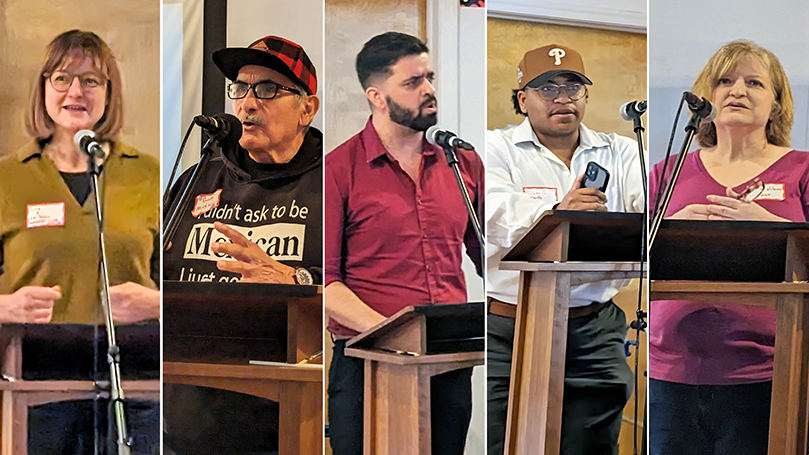
Highlighting unions like the UE, SWU, UFCW Local 3000, and APWU that have publicly called for a ceasefire, those who participated with the Labor Commission’s workshop discussed organizing around labor-backed ceasefire petitions on the shop floor.
Dom Shannon, giving a report on behalf of the African American Equality Commission, called the trillion-dollar military budget a “form of welfare for the 0.01%.” Together with “money spent on … ICE and border patrol, and the funds spent on racist policing,” Shannon said it supports “the obscenely unequal distribution of wealth in the U.S. and globally under capitalism.”
Debra Wilmer, speaking on behalf of the Immigration Subcommittee on Saturday, pointed out that “immigration to the U.S. and globally today is fueled by the policies of imperialism.” Highlighting the fact that “racism is a primary driver of U.S. immigration policy and border militarization,” Wilmer also said it creates a group of workers who are only able to work in the underground economy. “Spending billions of dollars building walls will not deter people who are oppressed, occupied and struggling to survive due to economic blockades.”
Tackling issues like language barriers, and how to give organization and political direction to spontaneous movements, the workshop on building the peace movement in communities of color also discussed why the peace movement in recent years has been mainly white and how to change that.
“The most important thing that we could do,” Eric Brooks said on Sunday, “is meet people where they’re at, in the struggles that they’re already engaging in, and show how those struggles relate to the peace movement. We have to take the money that we’re spending now to oppress people and demand that money be spent for housing, for food, for education, for healthcare, for roads, and for potable water!”
Also discussed in the workshop was the important role of art, culture, and food in bringing people together, especially in organizing those that are not already politicized.
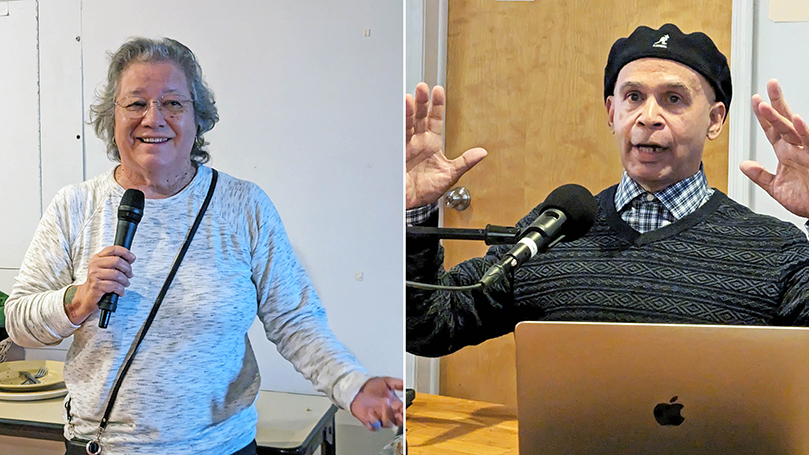
For the Young Communist League, the issue of free speech loomed large as groups like Students for Justice in Palestine and Jewish Voice for Peace are being banned on college campuses. “We believe the repression that is targeting youth activists right now is a part of the fascist offensive that is trying to erode away our people’s democratic rights,” YCL leader Aaron Booe noted. “There’s a lot of interest right now in learning how to concretely apply the principles of the popular front to the struggles of youth.”
Booe noted this includes “getting ceasefire resolutions to come out of student associations, student councils and other mass organizations of youth.” Other proposals for action included counter–military recruitment and divestment campaigns, “so that our campuses become inhospitable to these [war] interests.”
Warning against the kind of individualistic attitudes that capitalism breeds, Cambron emphasized the importance of having a unifying approach to organizing. “As we go out after this conference to build that peace movement, we need to be mindful that how we make people feel is really important as to whether or not we build trust. We want a movement that is solid, and the only way we can do that is through respect, through listening to each other, through not interrupting, and not being patronizing.”
CPUSA co-chair Joe Sims stressed in his summary of the conference that voters faced a stark choice come November. It’s bourgeois democracy “or a fascist concentration camp,” he said. Sims observed the best contribution we can make to supporting Palestine is defeating the Biden administration’s policy. “We have to defeat U.S. imperialism here at home.”
Quoting W.E.B. Du Bois, he said, “Peace is not an end to be achieved, but the gateway to a new civilization,” adding, “We are walking, marching, dancing toward that gate. And the gate is working-class power. Our party has a big contribution to make in solidifying the fight for peace, and with all of you, I am sure we’re going to get there.”
Click here for more on the CPUSA 2023 Peace Conference.
Images: CPUSA
- Tags:
- Anti-war movement
- ceasefire
- Cold War
- Communist Party of Israel
- Elections
- Elections 2024
- fascism
- free speech
- grassroots organizing
- Immigration
- Immigration Reform
- imperialism
- Israel
- Israel & Palestine
- Labor
- Labor Organizing
- militarism
- military budget
- Palestine
- Palestinian People's Party
- peace
- Peace Conference 2023
- Police violence
- Popular Front
- Racism
- students
- war
- women
- YCL
- Young Communist League
- Youth

 Join Now
Join Now